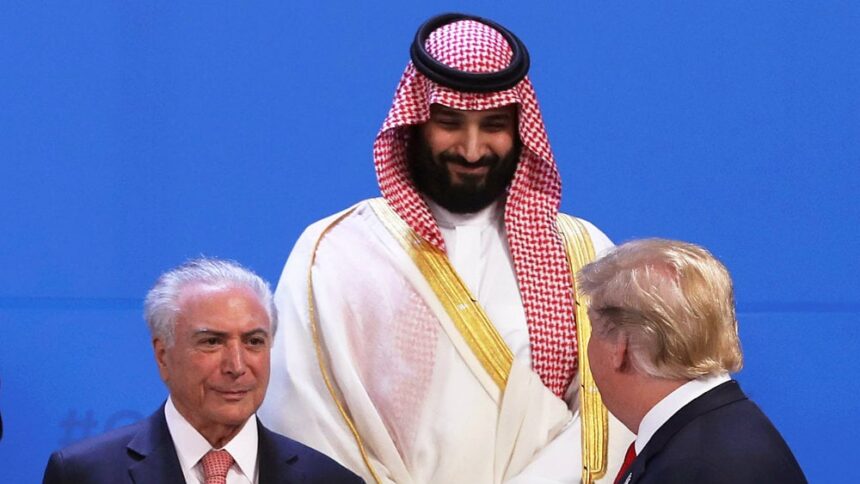Saudi Arabia, traditionally navigating complex relationships with both Israel and Shiite Iran, has now strongly condemned Israel’s recent actions. The Kingdom finds itself in a precarious position, fearing a wider regional conflagration in the Middle East.
Just hours after Friday’s Israeli attack on multiple targets in Iran, the Saudi Ministry of Foreign Affairs issued a statement on X (formerly Twitter): “The Kingdom of Saudi Arabia strongly condemns the blatant Israeli aggression against the brotherly Islamic Republic of Iran.” The statement added that this “aggression” undermines Iran’s sovereignty and security and represents a clear violation of international law.
Saudi Arabia’s Precarious Position
Saudi Arabia is in a difficult situation. For years, Israel has sought to normalize relations with Arab states, particularly those on the Arabian Peninsula. This policy led to the Abraham Accords, which redefined relations between Israel and some regional states, aiming to establish and expand diplomatic, economic, and security ties. In the summer of 2020, the United Arab Emirates (UAE) and Bahrain signed such agreements.
However, Saudi Arabia has not yet concluded an agreement with Israel. Although informal consultations between the two countries have been ongoing for years, Riyadh has so far avoided giving the impression that, as the guardian of Islam’s holy sites, closer ties with Israel would distance it from traditional solidarity with the Palestinians.
Rapprochement with Iran
This stance has become even more pronounced since October 7, 2023, when the militant Islamist organization Hamas – classified as a terrorist organization by Germany, the European Union, the U.S., and some other countries – attacked Israeli territory, killing approximately 1,170 people and abducting 255. Saudi Arabia, like most Arab and Islamic countries, reacted to the Israeli military response significantly more critically than most Western states. According to a BBC report from November 2024, Saudi Crown Prince Mohammed bin Salman accused Israel of “genocide” in Gaza. Nevertheless, Saudi Arabia continues to permit Israeli planes to overfly its territory en route to the Emirates, a practice that began in 2020.
At the same time, Riyadh has significantly drawn closer to Tehran in recent years. After the two countries broke diplomatic relations in 2016, they restored them in March 2023 with China’s mediation.
According to Markus Schneider, a Middle East expert at the Friedrich Ebert Foundation in Beirut, the Gulf states – primarily Saudi Arabia and the Emirates – already had the current scenario in mind. “In the capitals of the Arabian Peninsula, they are aware that they are exposed on a silver platter if a war breaks out between Israel and Iran. Unlike Israel, they are not protected by effective defense systems. This has long caused fear, which is why they have always tried to prevent escalation from the Israeli side through the U.S.”
Saudi Balancing Act
Saudi Arabia has been balancing since October 7, 2023, says Sebastian Sons, an expert on Gulf states at the German think tank Carpo. “The country advocates for de-escalation with all its neighbors. In this regard, it has sought to act as a platform for dialogue in various conflicts and has organized several large summits, including one on the war in Gaza, in which Iranian representatives regularly participated. These diplomatic activities are part of the Saudi political model based on rapprochement, not conflict.”
Therefore, an escalation of the conflict between Iran and Israel would be the worst possible scenario. “Because Saudi Arabia would then be caught in the middle of the storm, and there is concern that its national territory could be attacked, as American troops are also stationed there.” There is also concern that the Iran-aligned Houthi paramilitary group from Yemen could resume attacks. Riyadh vividly remembers the paramilitary group’s attacks on Saudi Aramco oil facilities in September 2019.
Consequently, Saudi Arabia has worked even more decisively on further developing relations with Iran, Sons says. “The underlying ambition is to move from tactical to strategic rapprochement and expand cooperation in more areas, such as security.”
“However, Saudi Arabia still does not trust Iran. There is great distrust towards its neighbor, which makes the current situation very difficult to predict for Riyadh,” Sons adds. That is why the choice of words used by the Saudi Ministry of Foreign Affairs in criticizing the Israeli attack is particularly significant, Schneider says. “The fact that the Ministry on platform X speaks of an attack on ‘brotherly’ Iran shows how dramatic the situation is. The term ‘brother’ or ‘brotherly’ is otherwise only used for Arab countries. Such a choice of words shows that Saudi Arabia under no circumstances wants to be perceived as an ally of Israel.”
Concerns in Oman and Iraq
Oman also now sees a threat to the possibility of a diplomatic solution to the dispute over Iran’s nuclear program. This country at the southern tip of the Arabian Peninsula has mediated negotiations between Iran and the U.S. According to agency reports, the country criticized Israel’s action, stating that the attack endangers regional security and stability. Nevertheless, negotiations between the U.S. and Iran are apparently expected to continue. But when, no one knows.
Concern also prevails in Iraq. A number of Iran-linked paramilitary groups, such as Kataib Hezbollah, are located in that country. These Shiite groups are closer to the authorities in Tehran than to those in Baghdad. Through the political wing of these militias, Iranian influence extends even to the Iraqi parliament. “If Tehran now tells them that the situation is critical, they could take up arms,” says Schneider. “They could attack American forces stationed in Iraq or other American targets. That is why the U.S. evacuated diplomatic personnel days earlier. And that shows how unpredictable the situation in the region currently is.”







